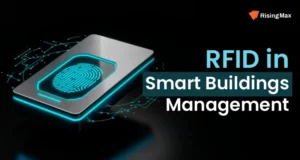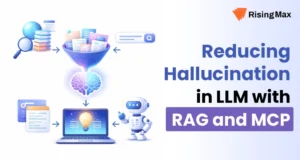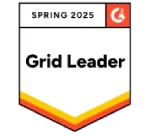Today’s internet is afloat with buzzwords such as NFTs, digital assets, crypto, tokenizations, and more. With the rising popularity of NFTs like CryptoPunk, Crossroad, and NFT marketplaces like Opensea and Rarible there are daily headlines of staggering investments in NFT marketplaces.

In 2022, the NFT market witnessed around $24.7 billion in trading volume across different platforms.
The effect of NFT marketplace platforms is underway, catering to the creators, buyers and sellers of these assets. The NFT marketplace enables artists, entrepreneurs, enthusiasts, or creators to trade and earn from their NFTs.
However, NFTs are still an unexplored territory for many businesses like yours.
How will NFT marketplace development be lucrative for your business in the coming year?
Let’s discover its answer through the benefits of NFT marketplace development for businesses. Learn about the established NFT marketplaces to help you know what it will bring to your table in 2026.
Benefits of Developing NFT Marketplace in 2026
One of the significant considerations for businesses looking to enter the NFT space is choosing between developing a new or investing in whitelabel NFT marketplace. Though both are fruitful in their ways, they successfully offer the following benefits.
Improve Marketing Strategy Through Decentralization
Owning an NFT marketplace allows you to develop a decentralized platform for your users. They can easily buy, sell, and trade digital assets and tokens on your NFT marketplace platform.
For instance, Nike has dipped its toes into the NFT world after it announced the acquisition of RTFKT Studios in December 2021. RTFKT sold digital items like sneakers in the form of NFTs, drawing the attention of many users.
Create New Revenue Streams
NFTs allow businesses to digitize and monetize their assets- music, art, virtual real estate, or in-game items. They offer a transparent and secure way to prove ownership and sell these assets, building new revenue streams.
For instance, Dolce & Gabbana set a $6 million record for fashion NFTs. The largest fashion NFT sale came to the business in 2021.
Gain Users Via Collaborations and Partnerships
NFT marketplace allows businesses to engage with renowned celebrities, artists, or brands in premier collaborations and partnerships. By capitalizing on the influence and popularity of such collaborations, NFT marketplace owners will attract a large user base, increase brand awareness, and produce profits through enhanced transaction volumes and brand partnerships.
For instance, Gucci, in 2021, collaborated with Arianee, a blockchain technology provider, to release an NFTs collection, including digital versions of the brand’s handbags, boosting customer experiences.
Earn Royalties on Secondary Sales Royalties
If an individual buys your product and decides to sell it later, it gives no profit to you in that secondary sale. But the NFT space provides lucrative ways to do business. NFT marketplace’s unique aspect is letting creators gain royalties on secondary sales.
A percentage of the sale value returns to the original creator whenever an NFT is resold on the marketplace. Thus, a company can profit from the full lifespan of a digital product with integrated smart contracts.
Get Next-Gen NFT Marketplaces Solutions For Your Digital Business
In the realm of bespoke offerings, we excel in providing NFT marketplace solutions fortified by acclaimed and resilient NFT trading arenas. Our intent is clear: to empower you with a distinctive competitive advantage in the market.
Top NFT Marketplaces So Far
The NFT market has developed rapidly in the past few years, having a huge chance for business investments in 2026. Below are the top NFT marketplaces that have already skyrocketed their revenue graph.
OpenSea
It gains its main revenue through transaction fees, charging about 2.5% of the selling price for every sale. This fee is charged only to the buyer. Founded in 2017, OpenSea collected $1.8 billion in fees for the past year and earned $571.1 million (31.73% of the total collected fees) in December 2022.
Rarible
Established in 2019, Rarible now has an estimated annual revenue of $17.8M annually. It functions on the Ethereum blockchain, ensuring transactions are transparent, tamper-proof, and secure.
SuperRare
A curated NFT marketplace provides a unique selection of digital assets for sale. It has 7,000+ artists using this platform since its inception in 2018. In 2021, the platform witnessed sales of $10 million to $ 30 million monthly.
Nifty Gateway
Founded in 2018, Nifty Gateway allows users to buy and sell NFTs using cryptocurrencies, such as Ethereum, Bitcoin, and USDC. In May 2020 and September 2021, total sales of NFTs on the Nifty Gateway amounted to around 408.8 million US dollars, including primary and secondary markets.
Foundation
Launched in 2021, the Foundation makes sales through Ethereum and has sold more than $100 million of NFTs.
These NFT marketplaces are already booming and creating benchmarks for other businesses. Having an NFT marketplace developed for your business will allow you to offer a space for NFT collectors to help them find what they are looking for, filling your revenue bucket.
There are umpteen reasons to develop an NFT marketplace for your business in 2026, especially when NFT’s weekly sales volume has risen from 100 sales in 2017 to 15,000 and 50,000 in 2022.
Are NFTs Marketplace Profitable in 2026?
The CoinGecko report estimates that the NFT industry will be worth over $800 billion by 2026.
Businesses planning to develop an NFT marketplace will leverage the booming NFT ecosystems by providing traders, artists, and collectors with a platform to engage in the trading, buying, and selling of digital assets.
The significant revenue streams for NFT marketplaces include listing fees, secondary market fees, transaction fees, partnerships, and premium features.
Investing in NFT marketplace development provides modern businesses with a way to transform their asset portfolio beyond traditional investments such as bonds and stocks.
On the other hand, it becomes contentious for business owners to think if it would work for them. Let’s discuss!
Is NFT Marketplace Profitable for the Gaming Industry?
The P2E gaming industry is creating new platforms for players to make, buy, and sell in-game NFT assets. It creates better opportunities for businesses to start gaming-related platforms that strengthen their customer base.
Axie Infinity and The Sandbox have built NFTs as in-game items for players to own and trade virtual items. It gives new revenue streams for the NFT based game developers and offers players a sense of investment and ownership in the game.
Thus, gaming businesses investing in NFT marketplaces will stay ahead in the curve.
Is NFT Marketplace Profitable for the Art World?
NFTs in the art world create opportunities for artists and galleries to sell NFTs of digital artworks. They provide a new way for collectors to own distinctive pieces and artists to monetize their work.
A dedicated NFT marketplace for art offers a way for artists and creators to reach a global audience and help gain recognition with their increase in popularity.
Is NFT Marketplace Profitable for the Music Sector?
The music NFT marketplace development allows musicians to propose their albums as digitized tokens and motivates fans to trade their assets for premium revenue.
Musicians like Grimes and Kings of Leon sold NFTs of their music, concert, and merchandise experiences, delivering new ways to prosper their work and allow followers to get a piece of their favorite artist’s legacy.
If you are one of those interested in creating a music NFT marketplace that works, you must contact us for the best NFT marketplace development services.
Is NFT Marketplace Profitable for Real Estate?
Developing NFT marketplaces in the real estate industry benefits investors and property owners. One of the primary advantages is the enhanced liquidity of real estate assets. Traditionally, buying or selling a property consumes time and effort. NFT marketplaces streamline transactions, making buying and selling fractional ownership simpler in real estate properties.
For instance, you can invest in real-estate NFT marketplace to allow users to buy, sell, or trade real-world or virtual land NFTs.
Is NFT Marketplace Profitable for the Fashion Industry?
The first recorded sale of a fashion NFT was The Fabricant’s iridescent dress, sold for $9500 in May 2019. Using the NFT marketplace in the fashion business in 2026 will garner the global attention of the target audience.
Also, NFTs will bring a new flavor to achieving your fashion desires within a virtual space with metaverse involvement. They will boost the scope of brands venturing into the platform with their unique theme and concepts in fashion, with no boundaries in the decentralized world.
Wrapping Up!
The NFT market is escalating significantly and evolving with new applications. Business owners can be on cloud nine if they begin their NFT venture in 2026, as witnessed by the progress of leading brands investing in NFT marketplaces.
The possibilities are endless, from NFT gaming and marketplaces to real estate and virtual reality. Developing an NFT marketplace is not a sole job, as many steps are involved, and different technologies are required.
It is possible if you reach out to the right NFT marketplace development company to let your business step up the ladder of success.















